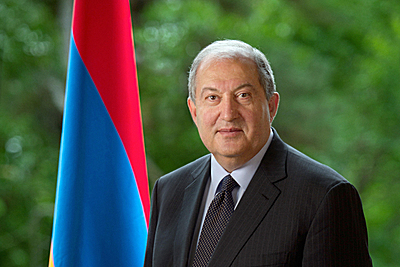Statements and messages of the President of RA
Address of H.E. Armen Sarkissian, the President of the Republic of Armenia “Holocaust Remembrance Week” dedicated to the 75th anniversary of the liberation of Auschwitz-Birkenau concentration and extermination camp and the end of World War II
Armenian Genocide Museum-Institute
January 29, 2020
Dear friends,
Dear representatives of the Jewish community of Armenia,
Dear participants of the Holocaust Remembrance Week
The Holocaust Remembrance Week, dedicated to the 75th anniversary of the liberation of the Auschwitz-Birkenau concentration and extermination camp and the end of World War II, and today's event is not only a tribute to the Jewish people, victims of the Holocaust, but also a reminder for the prevention of similar crimes.
By paying tribute to the memory of Holocaust victims, we express our solidarity with the Jewish people and reaffirm our determination to remember the crimes of genocide whenever they happened, prevent such crimes from happening again, remember the suffering of the victims and survivors and ensure a safe and fulfilling life for them and their descendants wherever they are.
Both the Armenians and the Jewish people are interconnected by history and destiny, by the will to survive and preserve their identity. As a persecuted nation, we understand and share the pain of the tragedy of the Holocaust, we remember and pray for the Holocaust victims with the same sorrow as for the victims of the Armenian Genocide.
The soil of nowadays Armenia, which was repeatedly invaded, passed from hand to hand, and was destroyed over the centuries, has held Jewish traces and imprints that an attentive eye can spot on different things: people's habits and behaviors, architectural monuments, symbols, language...
In modern times, this land hosted new Jewish families, who consider Armenia as their home country and who did not leave it even during the most difficult times of the recent decades.
I express my solidarity, respect and gratitude to the Jewish community of Armenia, to each and every member of the community who, through their work and talent, contribute to the development of our country and enrich its economy, science and culture.
We are grateful to all the Jews worldwide who have been with us for a century fighting against genocide: a grave crime against humanity, in order to strongly condemn it and to prevent such crimes in the future.
My nation, which has fallen victim to xenophobia and extreme political adventurism, is highly sensitive to one of its most frightful manifestations, anti-Semitism. We have seen what global misfortunes and disasters it leads to. We know that the last refuge of the political losers is to look for the guilty among the "strangers". Today, I attribute the anti-Semitism not only to the ethnic Jews, but also to my own nation, who were annihilated for almost the same reasons by the Young Turks, early in the 20th century, ancestors and teachers of the Nazis. Did Hitler not say in August 1939: "Who, after all, remembers the massacres of the Armenians today?"
Therefore, anti-Semitism, as a classic example of xenophobia and racial discrimination, must be eradicated everywhere in all its manifestations.
That is also why on March 22, 2013, Armenia initiated the UN Resolution on the Prevention of Genocide, which was joined by 62 states. On September 11, 2015, Resolution 69/323 presented by Armenia was unanimously adopted at the 69th session of the UN General Assembly, which declared December 9 as the International Day of Remembrance and Dignity of the Genocide Victims.
I believe that the world states and the international community must take more consistent and effective steps to condemn crimes against humanity and to prevent the recurrence of the new ones. This struggle must not yield to political conjuncture and transient interests, but must be directed to the peaceful and shared future of mankind.
Last week, I was in Jerusalem to attend the Fifth World Holocaust Forum titled "Remembering the Holocaust, Fighting Anti-Semitism" at Yad Vashem. During that time, I met with the President of the State of Israel Reuven Rivlin. We agreed that we should fight together against all forms of fascism, racism, hatred and anti-Semitism.
The Armenian people suffered enormous losses, becoming a victim of xenophobia during the World War I. If the total number of casualties in that war is estimated at fifteen million, one in ten of them were Armenians, a fact, which is not mentioned in history textbooks and war accounts.
In the World War II, along with other nations, six hundred thousand Armenians rose to fight against the Nazism, of which three hundred thousand sacrificed their lives. That is a disproportionately great number, taking into account our previous human losses. At the same time, it shows our significant contribution to the elimination of this evil against humanity.
We expect the international community to duly appreciate this fact. We especially expect the Israeli state to properly assess the Armenian Genocide of 1915. I told my Jewish colleagues in Jerusalem that Israel should play a leading role and recognize the Armenian Genocide, stressing that the recognition and condemnation of this shameful page of history should not be conditioned by political expediencies.
The Armenians and the Jews bear a historical mission and responsibility: to perpetuate the memory of the victims of the Armenian Genocide and the Holocaust, the greatest atrocities committed against humanity, and to always keep the memory about this alive as a lesson, a reminder and a prevention for the mankind.
Neither the Auschwitz-Birkenau tragedy, nor the heroism of its liberators should disappear from our memory.
I welcome this initiative of the Armenian Genocide Museum-Institute and wish it all the best.
